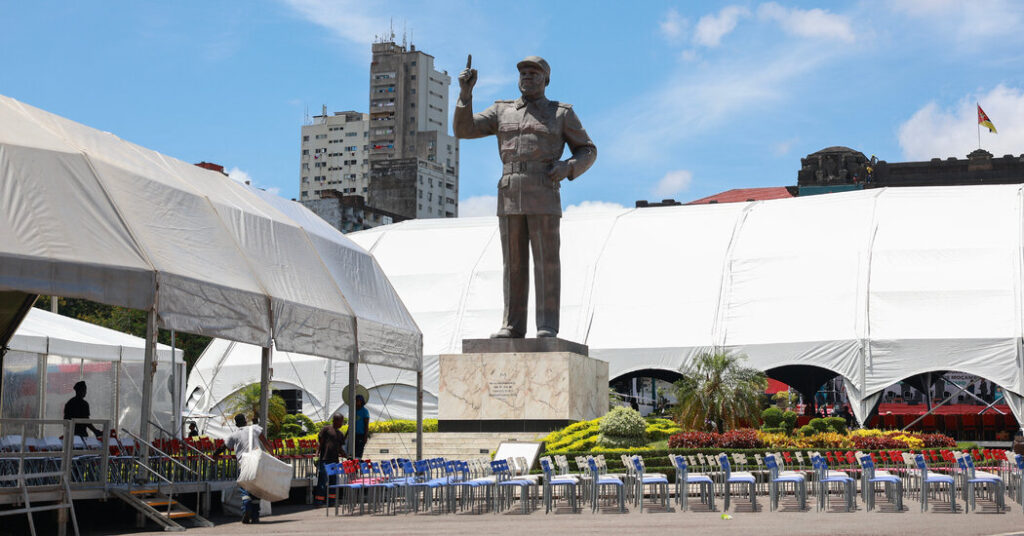Decades ago, Mozambique’s liberation party Frelimo easily attracted enthusiastic crowds. Relief from Portuguese colonizers and the promise of a life of work and shelter for all was easily accepted in the southern African country, which was suffering under racist rule.
But when Frelimo’s Daniel Chapo takes office as president on Wednesday, he will face a country more dissatisfied with his party than at any point in the country’s 50 years of independence. Tens of thousands of people took to the streets after October’s election, which voters, international observers, opposition leaders and rights groups harshly criticized as fraudulent.
The country of 33 million people has been mired in political turmoil since the vote. And now, as Mozambique faces an immediate economic and social crisis, Frelimo’s grip on power is being tested like never before, analysts say. Two of the three opposition parties boycotted the opening of parliament on Monday.
Voter anger has exploded into large-scale street protests in the past few months, leading to clashes with police. At least 300 people were killed.
Chapo and his party likely hoped that Wednesday’s inauguration would move the country toward reconciliation and stability. In fact, political observers say the challenges facing Frelimo’s leadership may be just beginning.
“Frelimo has gotten used to thinking of itself as the chosen party,” said Gabriel Mutisse, a former party official and current member. “They believed that elections were just a formality for the people to confirm their leadership. Over the past five to 10 years, things have shown that to be false. It’s coming.”
Last week, police responded with deadly force in the capital Maputo as supporters took to the streets to greet opposition leader Venancio Mondlane, who returned to Mozambique after a self-imposed exile. The ardent populist has won the support of disaffected young voters who see him as an ally in the fight against corrupt political elites.
Mondlane, who claims he won the election, has called for protests to continue, but this week has so far failed to attract the large-scale demonstrations that have shut down the capital and other cities in recent months.
In an interview in Maputo, Mondlane said he had been in touch with Chapo through mutual friends. He expressed hope that the next president will negotiate a resolution to end the political crisis and accept the reforms he has proposed in recent proposals. These reforms include building 3 million homes for poor Mozambicans and creating a $500 million fund for start-ups led by women and youth.
“We have to give the people something very important and tangible,” Mondrain said. “I don’t know if all the items in my proposal will be met, but I think we will start a dialogue.”
Protests are still necessary, he added, because “we have to put pressure on the government” to ensure reforms happen.
Chapo, 48, emerged last year as Frelimo’s unlikely presidential candidate. Unlike others in the party, he did not lobby for the nomination. Although he entered public office only 10 years ago, he long ago confronted the country’s troubled political history.
When he was five years old, he said his family was kidnapped by guerrilla forces fighting Frelimo during Mozambique’s 16-year civil war. A lawyer by training, he has served as a state governor and ran for president for the first time as part of Frelimo last year.
Branquinho João da Costa, 43, a doctor who lives part-time in Maputo, recalled his elementary school days when songs of freedom taught him and his classmates the glory of Frelimo. “It’s very difficult to be completely separated from Frelimo,” he says.
Many Mozambicans are currently unhappy with the party over corruption accusations and a failure to address rising prices, which he called “a new kind of slavery to the people.” Da Costa said Frelimo in its infancy was closer to the party’s socialist roots, and at the time was led by officials who cared less about wealth and power.
“Frelimo’s real purpose was to serve people,” he says. “Many of them are now fighting to gain political office just to steal from us.”
Some party members say Frelimo can no longer afford to ignore such criticism. Alsasia Sardinha, who was sworn in for a third term as a Frelimo lawmaker this week, said the past few months had been a warning.
“We must reinvent ourselves to meet the demands of our people,” she said. That reinvention includes the party cracking down on its own government for wrongdoing, she added.
Mtise, a former Frelimo official, said parliament could no longer ban the rubber stamp law introduced by the president. He said the party needs to focus on reforming institutions such as election commissions and courts to regain public trust.
Mr Mutise said this reform should be at the heart of negotiations with opposition parties.
“Everyone has to bring their ideas to the table so we can all believe in the next election,” he said.
